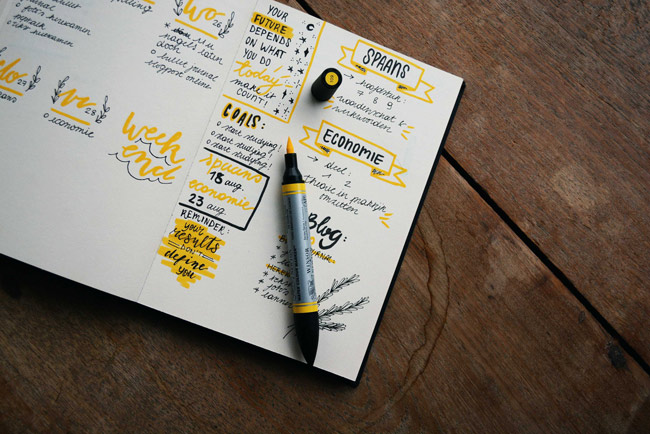We’re heading into 2018 with our new routines and we’re ready to improve things that have been bugging us for the past year. One of the complaints that I hear the most is that people don’t have time to do the things that they really want to do – join a gym, read more, write more, be outside… so it’s time to change that. What if I told you it would cost you less than £10? Here’s a guide to minimalist planning for 2018.
First step: Get a planner. A paper one. No excuse here.
Even though apps can be very functional, there’s something special about paper and actually writing down things in your schedule.
Studies have shown that what we read on paper lasts longer in our mind than what we read on our screens. So, let’s make good use of this. There are thousands of planners to choose from, with different displays and different sections. I highly suggest you get a week-on-view one. The only reason for this, is that planning a month can be difficult, and planning daily won’t allow us to see the bigger picture. But with a week-in-view planner, you get to organise your days and your week while keeping the big picture in mind.
Let’s get started. Sit down to plan your week on Sunday evening, every Sunday evening. This may seem like a drag, but it will actually allow you to sleep better knowing what to expect from the usual chaotic Mondays. There are four categories to keep in mind:
- Work and deadlines: Whether you work full time or part time, make sure to jot down your schedule so that you can see how many hours of the day you have left after or before work in order to accomplish all of those things that you really want to do.
- Activities: Treating activities as commitments will help you accomplish them! Make space for those activities in your routine by writing them down in your planner. Pilates or yoga classes, appointments with your hairdresser, and running errands are things you want to get done need to be prioritised so be sure to book in time for them.
- Social: All work and no play is not a great way to live. Approach your social meetings with the same discipline you have for work. Be sure to jot down if you’re meeting a friend for drinks or if you have date night with your partner.
- Self-care: Don’t forget to take time off for yourself as well. Self-care may mean very different things to different people, but be sure you have space at the end of each day to relax. Meditating works wonders for chaotic minds, and reading is a way better option for leisure than watching television in bed, (but we do love a Netflix and chill session).
You can organise these categories with different colours, different types of fonts or different stickers. There are endless ways to do it, and each of them will also allow you to be creative (if you want to). Just do some experimenting to see which one works best for you.
Your planner is there to be used, not to be kept pristine!
By now you may be wondering whether you’ll have to plan your whole week up to the minute each Sunday. Obviously, you don’t. The real goal of keeping a planner is to know what you are doing next but within limits. Organisation does not work without space for spontaneity and fluidity. So, maybe you had planned a Netflix night for Wednesday evening, but a good friend you haven’t seen in a while just suggested to have some drinks together. Go for it! Being spontaneous is fun and it’s key to breaking your routine and making you feel free. Also, by knowing what you have to do the next day it will leave your mind with only one task: To enjoy evening drinks with your friend.
Life may happen and maybe some days the daily planning won’t work for you. We all get sick, have families, and life can throw some unexpected challenges at us. This is why you should have a list of basic weekly goals that must be done: Food shopping, picking up your dress for your friend’s wedding from the dry-cleaners, etc. You MUST keep this list to a minimum, so that it covers your basic necessities but is still manageable under unexpected circumstances.
The best part of planning is not only the extra time that you’ll get, but also the clear mind that comes from knowing that you don’t have to remember everything.
Keeping mental to-do lists can be exhausting, and more often than not, we end up forgetting what’s really important. By writing things down, it’s more likely you’ll remember them (think about your notes when studying for an exam!) but it will also ensure you can check on them any time you want.
So, let the planner take care of all your to-do lists, events and dates, and leave you to enjoy your life. Happy living!
